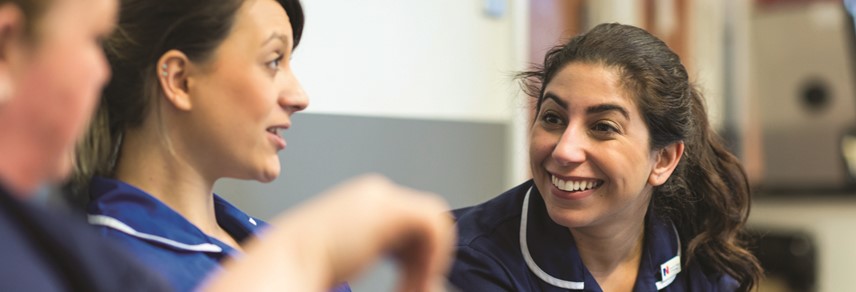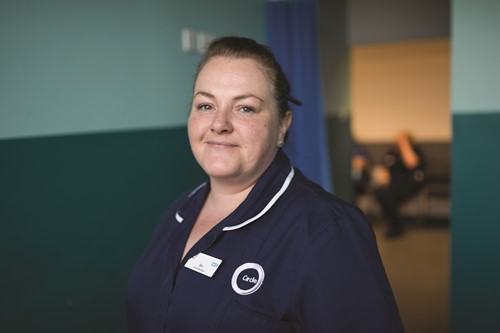
HEROES EVERYDAY
Those in the nursing profession were given the chance to shine through a Circle Health initiative to support and promote careers in nursing. Hassan Butt examines the #nurseheroes campaign
Challenge: In 2012, after the announcement of the largely criticised Health and Social Care Act, the public health landscape in the United Kingdom became one of the most contentious topics on the political and economic agenda. The bill proposed several shakeups, namely the end of NHS primary care trusts and strategic health authorities that operated at regional levels, shifting large chunks of the healthcare structure out of hospitals and onto community nurses. Statistics in 2012 suggested that as many as 44% of nurses confirmed they were looking to leave their jobs. By 2017, the number of people applying to study nursing at university had fallen by 19%. There still exists a decline in healthcare spending and nurses are being stretched thin across the NHS.
Today, the nursing profession continues to feel the effects of a bleak, tepid governmental outlook, leading to substantial dips in recruitment. Yet for the Royal College of Nursing (RCN), communicating the importance of the role amid the swarm of ongoing healthcare challenges remains critical. Announcing that 12 May – Florence Nightingale’s birthday – would be recognised as Nurses’ Day, the RCN teamed up with healthcare company, Circle Health, to further amplify the promotion of nursing through its digital campaign, #nurseheroes.
Strategy: Founded in 2004, Circle Health’s corporate structure has historically been twofold, its Circle Partnership previously set out a 49.9% staff ownership, with its principle financial entity, Circle Holdings, governing much of its finances. Since 2017, Circle Health has been 100% privately owned. Still regarded by many as a ‘new model’ of private healthcare, its recent investment in rehabilitation centres, as well as ongoing investment from hedge funds has led to the healthcare facilitator winning notable NHS contracts, with recent revenue figures for the provider exceeding £130m.
The #nurseheroes campaign allowed Circle Health’s credo, one that specifies a key focus on patient wellbeing, to be shared through a combined network of the RCN’s 124,000 Facebook followers and 90,000 Twitter followers. In addition, 61 paid Facebook posts were used to promote the campaign.
It also gave nurses across Circle’s facilities the chance to share their experiences as medical professionals, detailing the benefits of Circle’s working structures, as well as its growing community and outreach. Through a series of social media video interviews and photo portraits, as well as inclusion in the RCN’s internal magazine, the partnership’s cross-promotion was also leveraged through recruitment-focused events across Circle Health’s Nottingham facility.
The campaign revolved around Circle’s diverse network of nurses. Short testimonials from gynaecology, endoscopy and nursing leadership facilitated an emotive, qualitative drive to reaffirm nursing as a truly rewarding career choice. “People look out for each other, and we have a lot of banter, which is quite helpful and uplifting. We laugh and we joke, but at the same time ensure that we’re doing what’s best for the patients,” says Sulayman Jallow, endoscopy nurse at Circle Nottingham, in one of the campaign videos.
For Robert Zlokower, content marketing manager at Circle Health, deciphering the type of content that the campaign needed was crucial. “The idea was to leverage the efforts of the RCN, but then to adapt it for our own recruitment drive. We found that video was an effective medium, as often written content is not as emotive. We wanted to connect with our audience on an emotional level through narrative and storytelling, and video seemed the best fit,” says Zlokower.

Results: Benefitting from the halo effect, Circle Health’s #nurseheroes campaign strengthened the healthcare specialist’s relationship with the RCN, allowing Circle Health’s recruitment drive – particularly for its Nottingham facility – to be further developed. Total Facebook post engagements reached 10,332, with each post averaging 172 engagements ranging from likes, reactions, comments and shares. Facebook impressions for the #nureheroes campaign were recorded at 592,572 and across the collection of videos, views reached 1,977. “Using a 360-degree approach, we weren’t just limited to Facebook, we also set up a dedicated landing page, and leveraged the industry-wide hashtag. We had a live event so that nurses could come in person and pick up print collateral. We also had to make sure we engaged our internal stakeholders. When working in marketing, you need to have buy-in from the people you’re getting content from, that meant maintaining a good rapport with the nurses, but also the HR department – liaising with them from brief, through to strategy, planning, execution and measurement,” says Zlokower.
As of 13 July 2017, the project generated 104 enquiries into the nursing profession. Yet at the campaign’s crux was a drive to reinforce the value and importance of nursing – a notion that, amid the furore of debate surrounding medicine, continues to hold weight.
Projects like Circle Health and the RCN’s #nurseheroes work to support the often-complex dynamic of public sector work, whereby the plurality of the workforce is not only profound, but in flux with the diversity of the profession. Nursing remains one of the most important fields of work today, and in communicating this, the campaign succeeded in positively portraying the realities of the profession.
For more from Communicate magazine, follow us on Twitter





